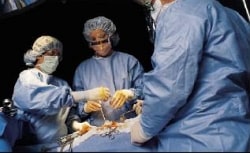Surgery can be difficult on the body in a number of ways and unfortunately night sweats after surgery is not uncommon.
There are a number of things that go along with surgery, from the anesthesia and medication to the incision and the procedure itself, and sometimes one or more of these things can cause night sweats after surgery.
What Causes Night Sweats After Surgery?
Not everyone experiences it, but excessive sweating after surgery is not uncommon. Some people even experience cold sweats after surgery where they wake up chilled but drenched in sweat. There are a few possible reasons for night sweats post surgery.
Anesthesia
While sweating isn’t listed as a common side effect of general anesthesia, some people may experience sweating while sleeping for the first couple of nights after surgery. Drinking more water may help your body cleanse more quickly and help provide relief. It is also possible the sweating experienced the first few days after surgery is due to inflammation and pain that results from the surgery.
Medications
Medications are one of the possible night sweats causes after surgery. This can include post-operative medications prescribed to help you deal with the pain experienced after surgery, or medications that were prescribed to treat your condition.
Painkillers prescribed for post-operative care have been known to cause sweating in some people. In some cases reducing the amount of painkillers or switching to a different medication has helped reduce night sweats. Keep in mind pain can also cause night sweats, so getting rid of your pain medication and dealing with the pain instead may not really provide help for night sweats. Always talk to your doctor before you make any changes to your prescribed medication.

Sometimes the medication prescribed to help treat a medical condition after surgery may cause night sweats. If you are taking medications to treat heart disease, cancer or another health condition and it is causing you to sweat excessively at night talk to your doctor to see if there is an alternative medication that may help reduce your night sweats.
Infection
Keep in mind one of the possible causes of night sweats is an infection. While most people don’t have a problem with infection after surgery, this is a possible risk with any incision. If you suspect you may have an infection because you have a fever with a temperature of 101 or higher and increased pain consult your doctor right away.
Low Blood Sugar
Low blood sugar, also known as hypoglycemia, can cause sweating at night. If you’re not eating enough or enough of the right foods after surgery this can cause sweating along with heart palpitations, irritability or dizziness.
Healing
The process of healing can also trigger night sweats in some people. In this case the best night sweats treatment is time and good care. Because inflammation is common during healing this may also contribute to the sweating you are experiencing. Talk to your doctor about anti-inflammatory medications if they weren’t already prescribed.
Note: Because of possible drug interactions and side effects it is important to carefully follow your doctor’s instructions for both prescribed medications and over-the-counter medications after surgery. Let your doctor know about any medications you are taking and follow his or her instructions.
Surgeries That May Cause Night Sweats
Sweating after surgery is a possibility after any type of surgery, but certain types of surgery have a greater risk of causing night sweats. This includes any surgery that interferes with hormone production.
One common example of this is a hysterectomy. Night sweats in women are often triggered by a hysterectomy. Removing the uterus and ovaries disrupts natural hormone production and it can cause low estrogen symptoms that are common during menopause. Even women under 40 can start experiencing menopause night sweats after a hysterectomy. Surgeries and treatment for various reproductive cancers are also common night sweats causes.
Along the same lines, night sweats in men can be caused by treatments for prostate cancer or other conditions of the prostate. Specifically, hormonal therapy used to treat prostate cancer has the possible side effect of hot flashes or sweating while sleeping.
Ironically surgery sometimes used to treat hyperhidrosis (the clinical term for excessive sweating) can also cause sweating after surgery.
Excessive Sweating After Surgery For Sweating
Hyperhidrosis is a medical condition that causes excessive sweating for no apparent or obvious reason, usually around the armpits, the palms, face or feet. This uncommon condition doesn’t cause a health risk, but because it can be embarrassing it can significantly impact a person’s day-to-day life.
There are a number of treatment options for hyperhidrosis, but if non-surgical options don’t work sometimes surgery is recommended to reduce the sweating in more severe cases. There are a few different types of surgery for hyperhidrosis. There are procedures to block or interrupt the nerve signals that cause the sweating. Another option is to remove the sweat glands in the affected areas.
Like any other procedure, unfortunately these procedures also come with some risk. Some people experience increased gustatory sweating – facial sweating when eating or smelling food after the surgery. This type of sweating is rarely severe though.
Another possible risk is compensatory sweating. Because surgery for sweating stops excessive sweating in certain parts of the body, the sweating may start to occur in other areas. The sweating may move to the low back, abdomen or groin area. In most cases the compensatory sweating isn’t as bad as the excessive sweating that was occurring before the surgery, but some sort of compensatory sweating is common after surgery for hyperhidrosis.
Night sweats after surgery isn’t necessarily uncommon, but it is important to talk to your doctor if you have concerns or if you continue to sweat at night for a long time after the surgery.
